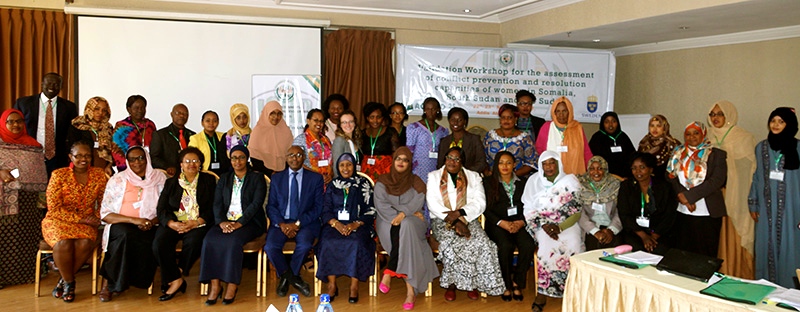23-11-2017, Addis Ababa (Ethiopia): The Director of Peace & Security Division of the Intergovernmental on Development (IGAD), Ambassador Tewolde Gebremeskel, yesterday opened a comparative validation workshop for the assessment of conflict prevention and resolution capacities of women in Somalia, South Sudan and the Sudan alongside Ms Irene Limo, Peacemaking Unit Coordinator-the African Centre for the Constructive Resolution of Disputes (ACCORD).
The comparative validation workshop aims to create a platform to discuss and validate the preliminary findings of the country assessments. Thus, the workshop is engaging key stakeholders from all three countries to discuss and compare the identified entry points for further capacity building so that the women’s interests and concerns are meaningfully included at all stages of peace processes.
The workshop discusses and compares the preliminary findings of the assessments and is to identify more opportunities to strengthen the outcome of the assessment on the capacities, role and impact of women’s participation in peace processes, in Somalia, South Sudan and the Sudan.
About 35 participants from the three assessed countries are attending this workshop.
Ambassador Tewolde welcomed the participants and highlighted the crucial role of women in peace making and peace building. He also noted the efforts deployed by IGAD for more gender inclusiveness in regional peace processes.
The assessments were jointly undertaken by ACCORD and IGAD Mediation Support Unit (MSU) and IGAD Gender Desk and ACCORD with financial support from the Swedish government.
Somalia, South Sudan and the Sudan were selected for in-country assessment of women’s existing agency in mediation, negotiation, reconciliation, peacebuilding and peacekeeping as they are currently experiencing conflict and transitions which are causing significant challenges to building sustainable peace
The comparative validation workshop is to validate the preliminary findings of the assessment by discussing the identified capacities of women and the mapped actors and programs that are currently enhancing women’s capabilities in mediation and negotiation.
###
